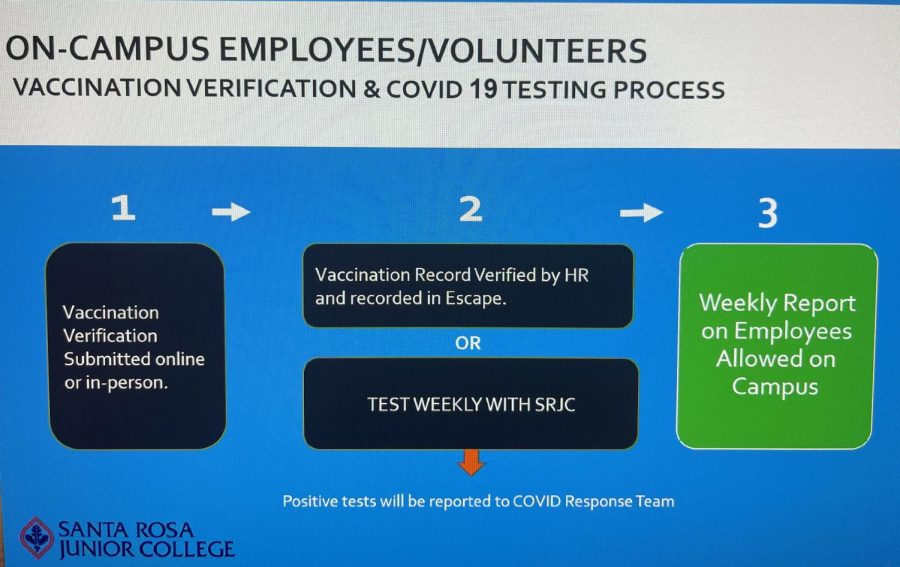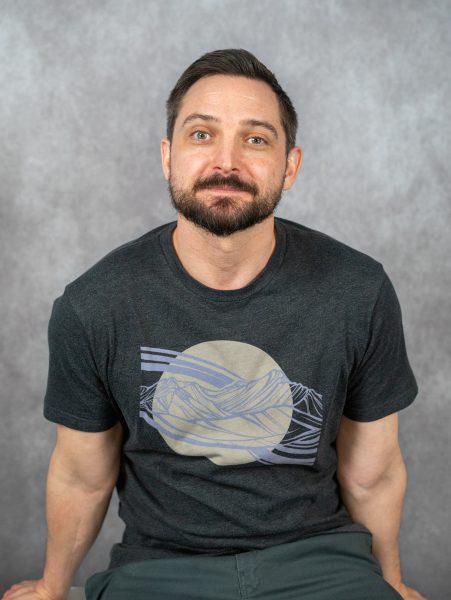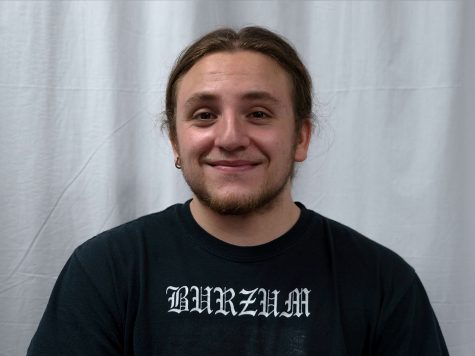The Santa Rosa Junior College Board of Trustees unanimously voted Sept. 14 to enact a vaccine mandate for students and employees on SRJC’s campuses for the Fall 2021 and Spring 2022 semesters.
Students and employees will have to provide proof of full vaccination or submit to weekly COVID-19 testing with Student Health Services to be allowed on campus starting Oct. 18. SRJC will require proof of full vaccination without the option of COVID-19 testing to be on campus starting Jan. 1, 2022.
SRJC President Dr. Frank Chong said SRJC will grant medical and religious exemptions to the mandate and that he is meeting with lawyers for guidance on these exemptions.
“We never want to say ‘no’ to someone who wants to take classes, but we’re in a public health crisis,” Dr. Chong said in an interview after the meeting.
Trustee Caroline Banuelos said she made her decision in the interest of public health.
“We, as individuals, have a responsibility to one another to make sure we’re all protected,” Banuelos said. ”As a board member, I have the responsibility to the college and greater communities to make sure that you are as protected as possible.”
Student Trustee Anetra McCartney said we are in the middle of a pandemic, and we need to think globally.
“I want to move forward with having a healthier campus where we don’t experience seeing students succumb to COVID-19,” McCartney said.
To start the process of verification, students, employees and volunteers will receive an email and text with a link to upload their vaccination record. Vaccination records will be reviewed by the company CLEARED4, which is used by multiple colleges across the state. Alternatively, students can submit to weekly COVID-19 tests with SRJC Student Health Services.
Regardless if someone chooses vaccination or testing, everyone must complete a CLEARED4 COVID-19 symptoms survey to receive a digital pass before coming to campus. Those who receive a digital pass can then check-in at a safety monitoring station to receive a daily clearance sticker.
SHS will conduct COVID-19 PCR testing by appointment Monday through Friday, with results available within 48 hours.
Vice President of Student Services Pedro Avila said SRJC will not use rapid tests because they are less accurate and produce more false negatives. However, rapid tests are still available and will be given to students and employees who have COVID-19 symptoms.
Unvaccinated students and employees who do not take a COVID-19 test will be unable to attend in-person classes and appointments.
A positive test will be reported to the COVID-19 Response Team, which will notify anyone who could have come in contact with that individual.
If anyone reports a change in COVID-19 symptoms on their symptom survey, they will not be cleared to come to campus that day. Students who arrive on campus without being cleared will be cited for misconduct.
McCartney said she used to be a safety monitor and is concerned about the safety monitors’ ability to enforce campus COVID-19 rules since many students have not been checking in as required and not adhering to the mask mandate.
Dr. Chong admits safety measures went awry during the initial Fall opening, but a lot of that had to do with staffing. He said SRJC began with 40 safety monitors, but now has 64.
“It’s a huge responsibility to implement a public health mandate that’s never been done before. I think we’re up for it and we’re learning as we go along,” Dr. Chong said.
Dr. Chong said 66% of the 6,000 students on campus are vaccinated, meaning SRJC must provide testing for the remaining 2,000 students.
He said one of the reasons SRJC is moving to vaccination only in Spring is because it does not have the capacity for ongoing testing. He also said waiting until Spring allows more breathing room for students and employees to make a decision.
Vice President of Human Resources Gene Durand said SRJC will provide resources for students and employees to obtain information about the vaccine to prepare for Jan. 1, 2022, when weekly testing will no longer be an option.
Students and faculty expressed both support and opposition to the mandate in the public comments.
SRJC Student Government Assembly President Delashay Carmona Benson spoke about losing her son to COVID-19 and burying him last weekend before she urged trustee members to vote in favor of the mandate.
“I sat there at the funeral thinking, what if this was one of our students? It was the hardest thing as a mom, and I can’t imagine putting any family through anything like this,” Benson said. “I’m for supporting safety. I support faculty wanting safety as well.”
Benson also asked if unvaccinated students would let other students know of their status so vaccinated students would have a choice whether to take a class with them.
History instructor Anne Donegan also supported the mandate.
“We are a college, we are an institution of higher education, science. Critical thinking and reason should be valued and supported,” Donegan said.
SRJC Track and Field Coach David Wellman supported the vaccine mandate but pushed for mandatory vaccination without the option for testing enacted immediately.
“We are working with unvaccinated students, faculty and staff on a daily basis, putting our lives and the lives of our loved ones at risk,” Wellman said. ”SRJC athletics has been running weekly testing since March 2021 and has learned the hard way that sanitizing surfaces and weekly testing do not prevent the spread COVID-19. Vaccinations do.”
However, not all those in attendance shared enthusiasm for the mandate.
Engineering student Nehemiah Skandera said that even though the science behind the vaccines is clear, a mandate infringes upon people’s personal freedoms.
Skandera was not alone in this position. “Mandates violate the constitution and our sacred God given right to bodily sovereignty,” said Yarrow Swegnisen, media services production tech. Swegnisen said he loves working at SRJC, but vaccine mandates are creating a rift in the community he has served for more than 25 years.
Dr. Chong said the vaccine mandate is not meant to split people apart.
“I can’t force people to do anything. I serve all students, those who agree and disagree with me,” he said.
Dr. Chong said it is important to get back to civil discourse, and not label or criticize people with different views.
Senior instructional assistant Rachel Nix claimed the vaccine caused “extreme disruption” to her menstrual cycle, which she said was a common side-effect among women.
The Centers for Disease Control and Prevention does not list changes in menstruation as a common side effect of the vaccine. According to the National Institutes of Health, some women have reported changes in their menstrual cycle after getting the vaccine, but it is hard to confirm causality since increased stress and changes in weight and exercise, all of which are common during the pandemic, can cause changes in menstruation. The NIH mentions that research is in progress to study the matter. They also state that some women who had COVID-19 have reported changes in their menstrual cycle.
Trustee Maggie Fishman addressed some of these concerns when she explained why she voted for the mandate.
“Mandating a vaccine for a deadly disease is not original, radical or innovative,” Fishman said. “I couldn’t have spent the years I have teaching without showing proof of vaccinations and having to be updated on my tuberculin tests every two years.”
Fishman said her decision was based on personal research and the experience of watching her son combat a brain infection after getting the chickenpox. If he was born a couple of years later, when the chickenpox vaccine mandates started, her son would have never been in danger.
Avila said the target date to finalize implementation of the vaccination verification system is Sept. 24. SRJC will pilot test the system this week and invite students to participate before the system goes live. There will be a live Zoom demonstration and Q&A for students to learn how to use the system on Oct. 1.
The vaccine verification system will go live Oct. 4 and the deadline to be verified is Oct. 15.
By Oct. 18, anyone not verified as fully vaccinated will have to submit to weekly testing to be on campus. The Student Welcome and Connect Center will provide support for students during this time, and the Human Resources Department will support employees.






